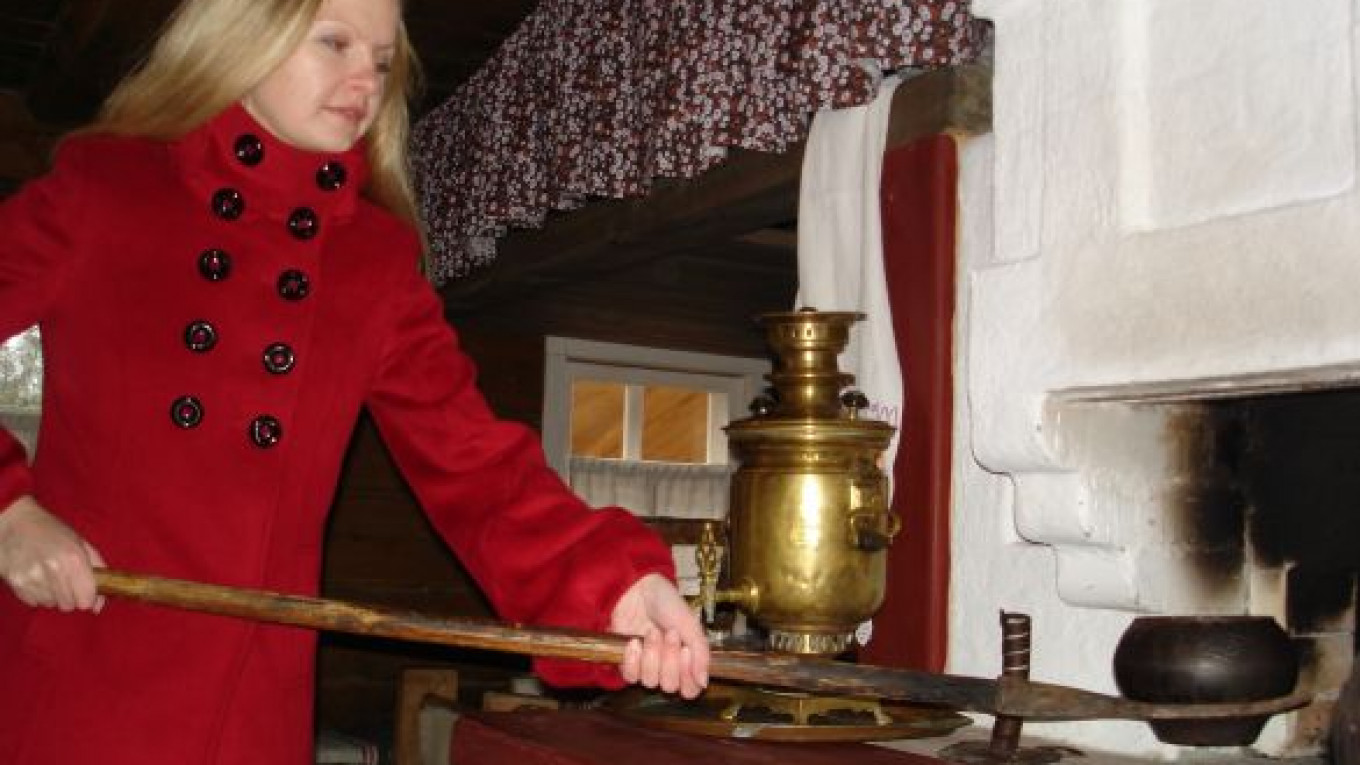VERKHNIYE MANDROGI, Leningrad Region — Visitors to this small settlement on the outskirts of the Leningrad region can catch a glimpse of a time long-forgotten by immersing themselves in 19th-century rural Russian life.
Located 260 kilometers northwest of St. Petersburg, Verkhniye Mandrogi is a rustic, wood-crafted village that has thoroughly recreated the simple life of pre-revolutionary Russia. Surrounded by forests and flanked by waterways on both sides, this timeless settlement along the Svir River offers something for almost anyone who wants to unwind from big-city life.
There are several relaxing banyas dotted around the village, two restaurants with excellent homestyle food, a vodka museum, crafts and cooking master classes, horseback riding and, for those seeking something a little more rustic, cozy cabins offering complete immersion in 19th-century Russia.
“It’s a harmonious blend of a historical and a modern way of life,” guide Olga Reshetova said. “Here it is possible to completely unwind from the noisy big city and learn something new about Russia’s past.”
Visitors can stay in wooden cabins — a number of which are authentic, 19th-century cottages, dismantled in the Arkhangelsk region and taken to Mandrogi — without modern conveniences, such as a television, gas stove or indoor plumbing.
“We strip you down, take your cell phone and put you in traditional village clothing,” Reshetova said as she led visitors on a press tour this fall. She showed journalists a wooden cabin with two cozy bedrooms, a large living room with a loom and a stone oven, a small stable on the ground floor with a cow and a horse, and outside, a banya beside a fresh-water lake.
“In Moscow, life is like a constant battle. Every day, you feel like you are simply aging. Here one can live normally,” said Reshetova, who escaped Moscow to live in the village a little over a year ago.
The village dates back to the 19th century but burned down during World War II. It was rebuilt in 1997 and has been attracting tourists ever since.
Tourists learn how to work the loom and fire up the wood stove and banya, cooking the food themselves and even doing chores like feeding hay to horses and cows.
Vladimir Totkalo and Neonila Shklyar are in charge of the village’s immersion aspect. They teach tourists about living in the old days, about tending to cows and horses, milling flour, weaving textiles on a loom and firing up a stove and “black,” or smoke-filled, banya.
When asked about the difficulties of living in a 19th-century village, Vladimir said: “For most folks, the hardest thing is waking up in the morning,” to get out of bed to start a fire and tend to the horses and cows as their ancestors did.
The less hardy can wimp out and opt for a cabin with running water and a television.
Where to Eat
Pavel Yankovsky, a chef from St. Petersburg, heads the main restaurant in the village center. Homestyle dishes using quail, duck and bear meat are specialities. Try the local kvas or khrenovukha (vodka with horse radish).
How to Get There
Almost a four-hour drive from St. Petersburg: Take the E105 northwest. At the 213 kilometer mark, at the sign for “Lodeinoye Pole,” drive to the right down the main street in the direction of Murmansk (through Lodeinoye Pole). After 23 kilometers, just beyond the bridge over the train tracks, at the sign, “Podporozhye — 45 kilometers,” take a right toward the town of Podporozhye. After 21 kilometers, you’ll see the sign to the village “Mandrogi.” The road to the village is on the left.
Where to Stay
A cabin with two or three bedrooms costs from 9,000 rubles a night. The village also has a small hotel charging from 2,200 rubles per night.
Verkhniye Mandrogi. Podporozhsky district, Leningrad region. Tel. (812) 347-9404. www.mandrogi.ru.
A Message from The Moscow Times:
Dear readers,
We are facing unprecedented challenges. Russia's Prosecutor General's Office has designated The Moscow Times as an "undesirable" organization, criminalizing our work and putting our staff at risk of prosecution. This follows our earlier unjust labeling as a "foreign agent."
These actions are direct attempts to silence independent journalism in Russia. The authorities claim our work "discredits the decisions of the Russian leadership." We see things differently: we strive to provide accurate, unbiased reporting on Russia.
We, the journalists of The Moscow Times, refuse to be silenced. But to continue our work, we need your help.
Your support, no matter how small, makes a world of difference. If you can, please support us monthly starting from just $2. It's quick to set up, and every contribution makes a significant impact.
By supporting The Moscow Times, you're defending open, independent journalism in the face of repression. Thank you for standing with us.
Remind me later.






